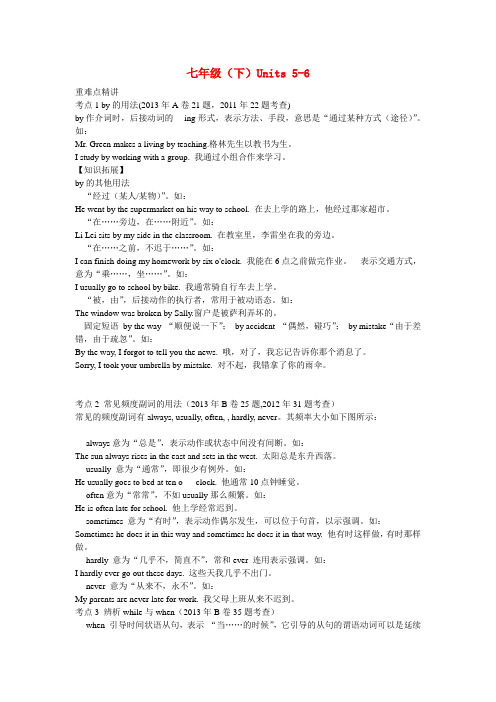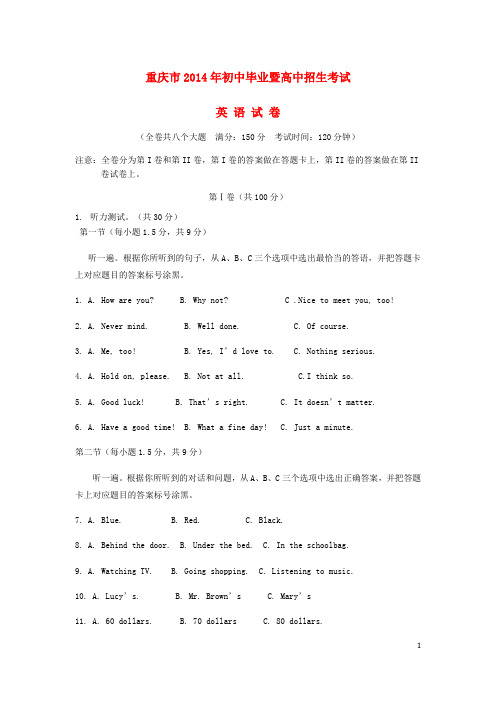重庆市2014届中考英语考点解密 第二部分 语法专题突破 专题十 情态动词 仁爱版
- 格式:doc
- 大小:31.00 KB
- 文档页数:2

七年级(下)Units 5-6重难点精讲考点1 by的用法(2013年A卷21题,2011年22题考查)by作介词时,后接动词的 ing形式,表示方法、手段,意思是“通过某种方式(途径)”。
如:Mr. Green makes a living by teaching.格林先生以教书为生。
I study by working with a group. 我通过小组合作来学习。
【知识拓展】by的其他用法“经过(某人/某物)”。
如:He went by the supermarket on his way to school. 在去上学的路上,他经过那家超市。
“在……旁边,在……附近”。
如:Li Lei sits by my side in the classroom. 在教室里,李雷坐在我的旁边。
“在……之前,不迟于……”。
如:I can finish doing my homework by six o'clock. 我能在6点之前做完作业。
表示交通方式,意为“乘……,坐……”。
如:I usually go to school by bike. 我通常骑自行车去上学。
“被,由”,后接动作的执行者,常用于被动语态。
如:The window was broken by Sally.窗户是被萨利弄坏的。
固定短语by the way “顺便说一下”;by accident “偶然,碰巧”;by mistake“由于差错,由于疏忽”。
如:By the way, I forgot to tell you the news. 哦,对了,我忘记告诉你那个消息了。
Sorry, I took your umbrella by mistake. 对不起,我错拿了你的雨伞。
考点2 常见频度副词的用法(2013年B卷25题,2012年31题考查)常见的频度副词有always, usually, often, , hardly, never。


2014年重庆中考英语真题及答案【2】IV. 阅读理解。
(每小题2分,共30分)阅读下列材料,从A、B、C、D四个选项中选出最佳答案,并把答题卡上对应题目的答案标号涂黑。
AHenry worked on a ship, doing tricks (魔术). Each week he showed the same tricks over and over again, because the passengers on the ship were different. There was also a parrot on the ship. It saw the shows so many times that it understood everything. Then it started shouting during the show: “Hey, he has put the flowers under the table!”“ All the cards are the same.”“Look carefully. It’s a different hat!”Henry was very angry but could do nothing.One day the ship had an accident and broke into pieces. Henry fell into the water. When he climbed up onto a piece of wood, he found the parrot there. He looked at the parrot angrily and did not say a word. This went on for one day, then another and another. In the end, the parrot said, “Oh, how I wish I hadn’t said anything during the shows. Please tell me where you’ve put the ship and I won\t open my mo uth again!”51. Henry worked on a ship, _______.A. doing tricksB. playing with a parrotC. selling flowersD. looking for his hat52. The parrot saw the shows so many times that ________.A. it knew where the ship wasB. it became very angryC. it didn’t want to say a wordD. it understood everything53. After the accident, Henry was on a piece of wood with ________.A. some passengersB. the parrotC. some cardsD. the table文章大意:介绍Henry与一只鹦鹉,每次Henry魔术表演时,鹦鹉都揭他的短,有一次发生事故,船被摧毁,只剩下他和鹦鹉的故事。

重庆市2014年初中毕业暨高中招生考试英语试卷(全卷共八个大题满分:150分考试时间:120分钟)注意:全卷分为第I卷和第II卷,第I卷的答案做在答题卡上,第II卷的答案做在第II 卷试卷上。
第Ⅰ卷(共100分)1.听力测试。
(共30分)第一节(每小题1.5分,共9分)听一遍。
根据你所听到的句子,从A、B、C三个选项中选出最恰当的答语,并把答题卡上对应题目的答案标号涂黑。
1. A. How are you? B. Why not? C .Nice to meet you, too!2. A. Never mind. B. Well done. C. Of course.3. A. Me, too! B. Yes, I’d love to. C. Nothing serious.4. A. Hold on, please. B. Not at all. C.I think so.5. A. Good luck! B. That’s right. C. It doesn’t matter.6. A. Have a good time! B. What a fine day! C. Just a minute.第二节(每小题1.5分,共9分)听一遍。
根据你所听到的对话和问题,从A、B、C三个选项中选出正确答案,并把答题卡上对应题目的答案标号涂黑。
7. A. Blue. B. Red. C. Black.8. A. Behind the door. B. Under the bed. C. In the schoolbag.9. A. Watching TV. B. Going shopping. C. Listening to music.10. A. Lucy’s. B. Mr. Brown’s C. Mary’s11. A. 60 dollars. B. 70 dollars C. 80 dollars.12.A.Next Friday B.Next Saturday C.Next Sunday第三节(每小题1.5分,共6分)听两遍。


2014年重庆中考英语真题及答案以下2014年重庆中考英语真题及答案由中考频道为您提供,希望对您有所帮助!重庆市2014年初中毕业暨高中招生考试英语试题 (B卷)(全卷共九个大题满分: 150分考试时间:120分钟)注意事项:1. 试题的答案书写在答题卡上,不得在试卷上直接作答。
2. 作答前认真阅读答题卡上的注意事项。
3. 考试结束,由监考人员将试题和答题卡一并收回。
第I卷 (共100分)I. 听力测试。
(共30分)第一节 (每小题1.5分,共9分)听一遍。
根据你所听到的句子,从A、B、C三个选项中选出最恰当的答语,并把答题卡上对应题目的答案标号涂黑。
1. A. How are you? B. Why not? C. Nice to meet you, too!2. A. Never mind. B. Well done. C. Of course.3. A. Me, too! B. Yes, I’d love to. C. Nothing serious.4. A. Hold on, please. B. Not at all. C. I think so.5. A. Good luck! B. That’s right. C. It doesn’t matter.6. A. Have a good time! B. What a fine day! C. Just a minute.第二节 (每小题1.5分,共9分)听一遍。
根据你所听到的对话和问题,从A、B、C三个选项中选出正确答案,并把答题卡上对应题目的答案标号涂黑。
7. A. Blue. B. Red. C. Black.8. A. Behind the door. B. Under the bed. C. In the schoolbag.9. A. Watching TV. B. Going shopping. C. Listening to music.10. A. Lucy’s. B. Mr. Brown’s. C. Mary’s.11. A. 60 dollars. B. 70 dollars. C. 80 dollars.12. A. Next Friday. B. Next Saturday. C. Next Sunday.第三节 (每小题1.5分,共6分)听两遍。
重庆市2014年初中毕业暨高中招生考试英语试卷(全卷共八个大题满分:150分考试时间:120分钟)注意:全卷分为第I卷和第II卷,第I卷的答案做在答题卡上,第II卷的答案做在第II卷试卷上。
第Ⅰ卷(共100分)1.听力测试。
(共30分)第一节(每小题1.5分,共9分)听一遍。
根据你所听到的句子,从A、B、C三个选项中选出最恰当的答语,并把答题卡上对应题目的答案标号涂黑。
1. A. How are you? B. Why not? C .Nice to meet you, too!2. A. Never mind. B. Well done. C. Of course.3. A. Me, too! B. Yes, I’d love to. C. Nothing serious.4. A. Hold on, please. B. Not at all. C.I think so.5. A. Good luck! B. That’s right. C. It doesn’t matter.6. A. Have a good time! B. What a fine day! C. Just a minute.第二节(每小题1.5分,共9分)听一遍。
根据你所听到的对话和问题,从A、B、C三个选项中选出正确答案,并把答题卡上对应题目的答案标号涂黑。
7. A. Blue. B. Red. C. Black.8. A. Behind the door. B. Under the bed. C. In the schoolbag.9. A. Watching TV. B. Going shopping. C. Listening to music.10. A. Lucy’s. B. Mr. Brown’s C. Mary’s11. A. 60 dollars. B. 70 dollars C. 80 dollars.12.A.Next Friday B.Next Saturday C.Next Sunday第三节(每小题1.5分,共6分)听两遍。
七年级(下)Units 7-8重难点精讲考点1 辨析alone与lonelyalone“单独的,独自的”可作形容词,只能作表语。
如:I was alone in the house. 我一个人在家。
alone还可作副词,表示“只有,仅仅,单独地”。
如:She lives alone in that large house. 她独自一人住在那所大房子里。
lonely是形容词,意为“孤独的,寂寞的”,有一定的感情色彩。
如:Sometimes he feels quite lonely because he has no friend. 有时候他感到非常孤独,因为他没有朋友。
考点2 辨析surprise,surprising与surprisedsurprise用作名词时意为“惊奇,吃惊”, to one's surprise意为“让某人吃惊的是”;用作动词时意为“使(某人)惊奇或吃惊”。
如:To their surprise, the poor boy didn t die. 使他们吃惊的是,那个可怜的男孩没有死。
The bad news didn't surprise them. 这个坏消息没使他们吃惊。
surprising为形容词,意为“令人吃惊的”,在句中多作定语,后面接名词,也可作表语,主语是物。
如:He told me some surprising news. 他告诉我了一些令人惊讶的消息。
The result is surprising. 结果是令人惊讶的。
surprised为形容词,在句中多作表语,主语是人。
常用于be surprised to do something “做某事令人吃惊,吃惊地去做……”;be surprised that, be surprised at (doing) something意为“对……感到吃惊”。
如:I was surprised to see him there. 在那儿见到他我很吃惊。
2014年全国部分省市中考英语试题分类汇编情态动词【2014四川成都】——Hate canno t drive out hate; only love ___________do that.——Martin Luther King, Jr.A. canB. mustC. should【答案】A【2014辽宁丹东】—Whose pencil box is this?—It _____ be Tom’s. It has his name on it.A.mustB. mayC. mightD. can’t【答案】A【2014福建福州】---Lisa ,hurry up !The bus is coming .--Oh ,no . We______cross the street until the traffic lights turn green .A. mustn’tB. needn’tC. should【答案】A【2014贵州安顺】 -Must I do my homework now? -No, you _ _. You may have a rest.A. mustn'tB. needn'tC. can'tD. wouldn't【答案】B【2014贵州贵阳】"Whose T-shirt is this?" "It_____ be John's. It's much too small for him.”[来源:]A. mightB. can'tC. needn't【答案】B【2014黑龙江龙东地区】-Must I get up at 6 o’clock?-No, you ________.You can get up at 7 o’clock. A. mustn’t B. needn’t C. can’t【答案】B【2014湖北鄂州】— I hope there _______ less pressure on us today.— If so, we _______ enjoy a more pleasant life.A. is; canB. will be; canC. will be; shouldD. is; should【答案】B【2014湖北十堰】—Mom, must I take out the trash now?—No, you ________. You may take a rest first. [来源:学科网ZXXK]A. mustn’tB. can’tC. shouldn’tD. don’t have to【答案】D【2014湖北武汉】–Is that Kate’s car?[来源:学科网ZXXK]--It ______be hers. She has just gone for a meeting.A. can’tB. shouldC. mustn’tD. may【答案】A【2014江西】We _______ pay to get into the concert. It's free.A. can'tB. mustn'tC. might notD. don't have to【答案】D【2014云南】34. We_____ use mobile phones when the plane takes offA. may notB. shouldn’tC. needn’tD. mustn’t【答案】D【2014徐州】4. There’s no light on—they be at home.A. can’tB. mustn’tC. needn’tD. shouldn’t【答案】A【2014无锡】4.—Life gets easier with the Internet.—That’s true! Almost everything be done online.A.canB.needC.mustD.should【答案】A【2014龙岩】34.— you sing the song Where Are You Going, Daddy?— Yes. It’s easy.A. CanB. MayC. Must【答案】A【2014乐山】30.–The manager says that there’s no hot water after8:00 tonight.[来源:]–You mean we ______ go to bed without a shower. How terrible!A. canB. have toC. may【答案】B【2014铜仁】—Must I water the flowers now, mum?—No, you . You do it later.A. mustn’t; mustB. mustn’t; ma yC. needn’t; mayD. needn’t; must【答案】【2014连云港】— I know by what time you want the project to be done?—By the day after tomorrow. you finish it on time?A. May; CanB. Must; NeedC. Could; MustD. Need; Would【答案】A【2014长沙】—Who’s singing in the garden?—It be Mr. Brown. He always practices singing atthis time.A. mustB. can’tC. need【答案】A【2014河北】I ______ follow you. Would you please repeat it?A. can’tB. mustn’tC. needn’tD. shouldn’t【答案】A【2014北京】—Must I hand in my homework now, Mr. Smith?—No, you _______.A. can’tB. shouldn’tC. wouldn’tD. needn’t【答案】D【2014扬州】—Excuse me, may I keep the book a little longer?—Sorry. You ________ return it today.A. mustB. mustn’tC. canD. can’t【答案】A【2014黔西南州】—Is the man over there Mr. Brown?—It ______ him. He has gone to Brazil to watch the 2014FIFA World Cup.A. may notB. can’t beC. shouldn’tD. mustn’t【答案】B【2014重庆市A】Children _______ si t in the front seat of a car. It’s too dangerous.A. needB. needn’tC. mustD. mustn’t【答案】D【2014安徽】—I forgot to bring my dictionary. Could I use yours?—Yes, you ______.A. canB. mustC. couldD. should【答案】A【2014重庆市B】The man is feeling much better now, so you ______ calla doctor.A. needn’tB. can’tC. mustn’tD. shouldn’t【答案】A【2014杭州】If you _____ smoke, please go outside.A. canB. mayC. mustD. might【答案】【2014东营】After you read the article “Why fast food is slowly killing you”, you stopeating fast food.A. canB. mayC. have toD. should【答案】B【2014天津】Look at the “No parking” sign. You _____park your car here.A. shouldB. mustC. needn’tD. mustn’t【答案】D【2014南昌】We ______ pay to get into the concert. It's free.A. can’tB. mustn’tC. might notD. don’t have to【答案】D【2014苏州】—May I take this magazine out of the reading room? —No, you _______. You read it in here.A. mightn’tB. won’tC. needn’tD. mustn’t【答案】D【2014宁波】—_______ you leave now? You only arrived here an hour ago. —Sorry, but so much homework is waiting for me.A. MayB. MustC. CanD. Might【答案】B【2014甘肃白银】—Must I go to law school and be a lawyer like you, dad?—No, you _______, son. You’re free to make your own decision.A. can’tB. mustn’tC. shouldn’tD. needn’t【答案】 D【2014丽水】Here is my phone number. You _______ call me anytime you like.A. mustB. canC. shouldD. need【答案】B【2014绍兴】—Let’s go climbing, shall we?—You _______ be joking! Don’t you know I’m afraid of high places?A. mayB. canC. mustD. should【答案】C【2014台州】—Are you interested in shopping online?—Not so much. We _______ see real products but pictures.A. shouldn’tB. can’tC. mustn’tD. needn’t【答案】B【2014泰安】—Could you please have a walk with me?—Sorry, I _______. I have something important to do now.[来源:]A. mustn’tB. needn’tC. can’tD. may not【答案】C【2014威海】—Bob, where is Linda?—She _______ be in the library, bu t I am not sure.A. mustB. mayC. needD. has to 【答案】B【2014滨州】—Must we take out the trash now?—_______. You can do it after class.A. Yes, you mustB. No, you can’tC. Yes, you mayD. No, you needn’t【答案】D【2014德州】—Lingling, can I use your e-dictionary?—Sure. But you _______ return it after class.A. mustB. canC. mayD. would【答案】A【2014菏泽】—Look, someone left a book.—Oh, yeah… This book _______ be Kitty’s. Only she likes to read this kind ofbooks.A. canB. mustC. mayD. might【答案】B【2014聊城】—Is the long-haired man Bruce?—No, it _______ be him. He’s in New York now.A. can’tB. mustn’tC. needn’tD. may not【答案】A【2014潍坊】People _______ wait until the traffic becomes green. That’s the traffic rule.A. mustB. canC. needD. may 【答案】A。
重庆市2014年初中毕业暨高中招生考试英语试卷(全卷共八个大题满分:150分考试时间:120分钟)注意:全卷分为第I卷和第II卷,第I卷的答案做在答题卡上,第II卷的答案做在第II 卷试卷上。
第Ⅰ卷(共100分)1.听力测试。
(共30分)第一节(每小题1.5分,共9分)听一遍。
根据你所听到的句子,从A、B、C三个选项中选出最恰当的答语,并把答题卡上对应题目的答案标号涂黑。
1. A. How are you? B. Why not? C .Nice to meet you, too!2. A. Never mind. B. Well done. C. Of course.3. A. Me, too! B. Yes, I’d love to. C. Nothing serious.4. A. Hold on, please. B. Not at all. C.I think so.5. A. Good luck! B. That’s right. C. It doesn’t matter.6. A. Have a good time! B. What a fine day! C. Just a minute.第二节(每小题1.5分,共9分)听一遍。
根据你所听到的对话和问题,从A、B、C三个选项中选出正确答案,并把答题卡上对应题目的答案标号涂黑。
7. A. Blue. B. Red. C. Black.8. A. Behind the door. B. Under the bed. C. In the schoolbag.9. A. Watching TV. B. Going shopping. C. Listening to music.10. A. Lucy’s. B. Mr. Brown’s C. Mary’s11. A. 60 dollars. B. 70 dollars C. 80 dollars.12.A.Next Friday B.Next Saturday C.Next Sunday第三节(每小题1.5分,共6分)听两遍。
1
专题十 情态动词
考点精讲
考点1 情态动词的基本用法
情态动词用法例句can(2009年33题,2011年30题,2013年A卷30题考查)
1. 表示能力,意为“能,会”,其否定式是can not等于can't。
I can play the guitar. I can't play the violin.我会弹吉他,不会拉小提琴。
2. 表示允许,意为“可以”,Can I...?意思是“我可以„„吗?”较口语化。
Can I go home now?我现在可以回家了吗?
3. 表示可能性,意为“可能”(猜测),常用在否定和疑问句中,其中can't表示不可能,
其肯定回答用may或must。
You can tell him about that now.你现在可以告诉他那件事了。
—Where can it be?它会在哪儿?
—It may (or) must be in your desk.它可能或一定在桌子里。
Miss Gao can't be at home now.高老师现在不可能在家。
could
1. 是can的过去式,表示过去的能力。
2. could也可表示较can更为委婉的语气。
Lucy could swim at the age of five.露西五岁就会游泳。
Could you help me?你能帮我吗?
3. 还可以表示猜测,意为“很可能”。
—Whose French book is this?这是谁的法语书?
—This could be Alice's. She studies French.可能是爱丽斯的。她学法语。
must(2013年B卷28题考查)
1. 表示说话人的主观意志,意为“必须”。
We must work hard at English.我们必须努力学习英语。
2. 表示猜测,意为“一定”,语气比may肯定,只用于肯定句中。
They must be very tired after a long walk.他们走了很长一段路后肯定很累。
3. must的否定式mustn't,表示“禁止,不允许”。
4. must表示肯定的猜测,表示否定的猜测用cant。
5. must引导的疑问句,否定回答用needn't (or) don't have to。
—Must I finish my work now?我必须现在完成工作吗?
—No, you needn't.不,你不需要。
need(2010年25题,2012年32题考查)
1. 作情态动词时意为“需要”,常用于疑问句和否定句中。
He needn't come here.他不需要来这里。
2. 作行为动词时,有人称和数的变化,后常跟不定式作宾语,只用于肯定句中。
He needs to see a doctor.他需要看医生。
3. 以need引导的疑问句,肯定回答用must,否定用needn't。
—Need I go there tomorrow?明天我需要去那儿吗?
—Yes, you must. (or) No, you needn't.是的,你必须去。/不,不需要。
may
1. “可以”,表示许可。
—May I look at your CD player?我可以看一下你的CD机吗?
2
—No, you mustn't (or) can't.不,你不可以。
2. “可能”,表示可能性(猜测),常用于肯定句中。
Your sister may be waiting for you now.你的姐姐/妹妹可能现在正在等你。
3. 以may引导的一般疑问句否定回答应为can't (or) mustn't。
might是may的过去式,表示猜测,可能性比could小。
—Whose guitar is this?这是谁的吉他?
—It might belong to Alice. She plays the guitar.可能是爱丽斯的。她弹吉他。
should意为“应该”。
You should go to see the doctor.你应该去看医生。
have to 表示客观需要,意为“不得不,必须”,有人称、时态和数的变化,后跟动词原形。
must与have to的区别:must表示说话人的主观看法,have to表示客观原因。
He had to stay at home because of the heavy rain.因为下大雨他不得不待在家里。
had better意为“最好„„”,没有人称和数的变化,后接不带to的不定式,即动词原形。
You'd better go there by bus.你最好乘公共汽车去那儿。
情态动词用法口诀
情态动词两要点:动词原形跟后面,
说话语气较委婉;can表能力may许可;
must 代表责任与义务,否定回答须用needn't;
should应该,would愿意,have to不得不表客观。
考点2 情态动词表推测的用法
1. 肯定推测
情态动词用法
must表示肯定推测,意为“一定”,语气最强烈
They must be very tired after a long walk.
他们一定很累了,走了这么长的路。
can表示可能性could表示肯定推测,意为“很可能”
Where can my book be?我的书可能在哪里呢?
The French book could be Alice's. She studies French.这本法语书很可能是爱丽丝的。
她学法语。
may表示肯定推测,意为“也许”,语气一般might表示肯定推测,意为“或许”,语气更弱
如:
Your sister may be waiting for you now. 你的姐姐或妹妹可能正在等你呢。
She might have gone to the library. She likes reading books in the afternoon. 她
或许去图书馆了。她下午喜欢看书。
2. 否定推测
情态动词用法can't表示否定推测,语气强烈,意为“一定不”
Miss Gao can't be in the classroom. I just saw her in the supermarket.高老师不可
能在教室,我刚刚在超市看见她了。
may not表示否定推测,语气不确定,意为“可能不”
It may not be my pen. 这可能不是我的笔。